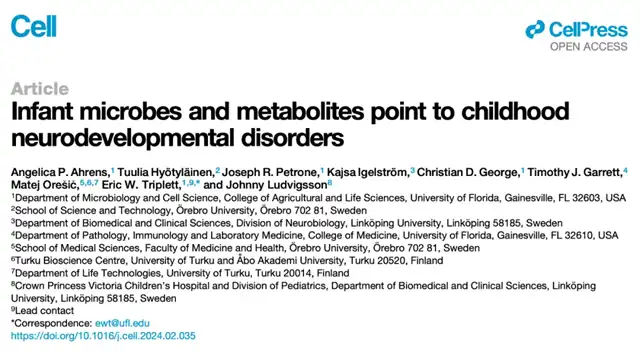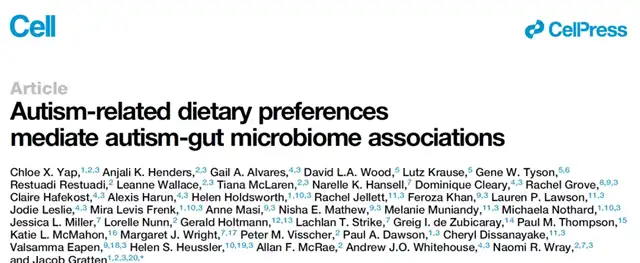Do Infant Microbes Influence Neurodevelopmental Disorders?
- Normal Liver Cells Found to Promote Cancer Metastasis to the Liver
- Nearly 80% Complete Remission: Breakthrough in ADC Anti-Tumor Treatment
- Vaccination Against Common Diseases May Prevent Dementia!
- New Alzheimer’s Disease (AD) Diagnosis and Staging Criteria
- Breakthrough in Alzheimer’s Disease: New Nasal Spray Halts Cognitive Decline by Targeting Toxic Protein
- Can the Tap Water at the Paris Olympics be Drunk Directly?
Do Infant Microbes Influence Neurodevelopmental Disorders?
- Should China be held legally responsible for the US’s $18 trillion COVID losses?
- CT Radiation Exposure Linked to Blood Cancer in Children and Adolescents
- FDA has mandated a top-level black box warning for all marketed CAR-T therapies
- Can people with high blood pressure eat peanuts?
- What is the difference between dopamine and dobutamine?
- How long can the patient live after heart stent surgery?
Do Infant Microbes Influence Neurodevelopmental Disorders?
The latest paper published in Cell once again confirms the association between gut microbiota and neurodevelopmental disorders such as autism and ADHD.
Neurodevelopmental disorders (ND) have profound and lasting effects on the maturation of the central nervous system, typically manifesting in childhood. ND includes disorders such as Autism Spectrum Disorder (ASD), Attention-Deficit/Hyperactivity Disorder (ADHD), intellectual disabilities, and communication disorders.
ASD is characterized by social difficulties and restrictive repetitive behaviors and interests, affecting 1%-2% of the population, while ADHD has a prevalence of 7% in children and 3.4% in adults, leading to significant physical and mental health burdens.
Communication disorders affect 5%-7% of people and may result in problems with speaking, expressing language, and understanding abstract concepts.
Previous studies have suggested a contribution of gut microbiota to neurodevelopmental disorders like autism, likely due to the gastrointestinal issues often present in autism patients and differences in their gut microbiota composition.
However, a study published in Cell in 2021 argued that the previous research had misconstrued the relationship between gut microbiota and autism. The differences in gut microbiota in children with autism were attributed to their dietary preferences related to autism, rather than gut microbiota differences causing autism.
On April 3, 2024, researchers from the University of Florida and Linköping University published a paper titled “Infant microbes and metabolites point to childhood neurodevelopmental disorders” in the prestigious academic journal Cell.
This longitudinal study tracked over 16,000 children for 20 years and found certain gut bacteria were negatively correlated with the progression of neurodevelopmental disorders (including autism, ADHD, intellectual disabilities, and communication disorders), early gastrointestinal symptoms, emotional issues, and HLA alleles associated with autoimmune diseases. This suggests a strong association between neurodevelopment, gut barrier function, and the immune system. The study suggests that the inflammation mediated by gut bacteria in early life may influence the risk of neurodevelopmental disorders, revealing the association between infant gut microbiota and metabolites and neurodevelopmental disorders.

Various prenatal and early life factors may contribute to neurodevelopmental disorders, but early diagnosis is challenging due to the lack of specific biomarkers. Genetic and environmental influences may disrupt neuroadaptation, leading to abnormal neuronal homeostasis, while immune dysregulation, inflammation, and autoantibodies may also play a role. Importantly, a significant proportion of individuals with autism also experience gastrointestinal symptoms, indicating a gut-brain connection.
Gut bacteria play crucial roles in metabolism, gastrointestinal health, neural health, and immune function, and may also be involved in neurodevelopmental disorders. Previous clinical studies have shown improvements in gastrointestinal and autism-related symptoms in autistic children after fecal microbiota transplantation, with some persistent benefits observed after two years. However, the exact contribution of gut bacteria to the etiology and pathophysiology of neurodevelopmental disorders remains unclear, and research findings in autism and ADHD are conflicting.
This latest study is the first prospective study aimed at investigating the relationship between infant gut microbiota composition and various other factors with childhood neurodevelopment of the nervous system. The researchers identified multiple biomarkers that appear to be associated with future neurodevelopmental disorders (including autism, ADHD, communication disorders, and intellectual disabilities).
The lead author of the paper, Professor Eric Triplett from the University of Florida, stated that a significant feature of this study is that these biomarkers were discovered in umbilical cord blood or feces at one year old, which is over a decade earlier than when neurodevelopmental disorders are typically diagnosed.
This study is part of the ABIS (All Babies in Southeast Sweden) study led by Professor Johnny Ludvigsson of Linköping University in Sweden. The study included over 16,000 children born between 1997 and 1999, who were followed from birth to over twenty years of age. Among them, 1197 children (7.3%) were diagnosed with Autism Spectrum Disorder (ASD), Attention Deficit and Hyperactivity Disorder (ADHD), intellectual disabilities, and communication disorders. Through multiple surveys conducted during the children’s growth, a large number of relevant lifestyle and environmental factors have been identified, and for some children, the research team analyzed substances in their umbilical cord blood at one year old and bacteria in their feces.
The research team found that during the first year after birth, there were already significant differences in the gut microbiota between those who would later be diagnosed with autism or ADHD and those who would not. The study also found factors that affect gut microbiota, such as repeated ear infections in the first year after birth, which are related to an increased risk of neurodevelopmental disorders in later life. The researchers suspect that the infection itself may not be the culprit, but rather that antibiotic treatment affects the gut microbiota. The study also found that the presence of Citrobacter or the absence of Coprococcus in the gut increased the risk of future neurodevelopmental disorders.
One possible explanation is that antibiotic treatment disrupts the composition of gut bacteria, leading to neurodevelopmental disorders. Previous studies have shown that antibiotic treatment can disrupt gut microbiota, increasing the risk of immune-related diseases (such as type 1 diabetes and juvenile rheumatoid arthritis).
The first author of the paper, Angelica Ahrens, stated that Coprococcus and Akkermansia muciniphila potentially have a protective effect, and these bacteria are defective in children with neurodevelopmental disorders. These bacteria are associated with important substances in the feces (such as vitamin B and neurotransmitter precursors), which play a crucial role in the brain.
The study also confirmed that children have an increased risk of neurodevelopmental disorders if their parents smoke, while breastfeeding has a protective effect.
The research team analyzed the content of various substances in umbilical cord blood collected at birth, such as fatty acids and amino acids, and also detected some harmful substances from external sources, such as nicotine and environmental toxins. They compared the substances in the umbilical cord blood of 27 children diagnosed with autism with an equal number of children who were not diagnosed with autism. The results showed that children later diagnosed with autism had several important lipids in their umbilical cord blood at birth, one of which was linoleic acid, which is necessary for the formation of ω-3 fatty acids that have anti-inflammatory effects and other effects on the brain. Additionally, they had higher levels of PFAS, which are a class of substances used as flame retardants and have been shown to have negative effects on the immune system in various ways. PFAS can enter the body through drinking water, food, and the air we breathe.
These studies raise a new question—whether gut microbiota imbalance is a triggering factor for neurodevelopmental disorders such as autism, or if these diseases are due to potential factors such as diet or antibiotics?
On November 11, 2021, a research team from the University of Queensland, Australia, published a paper titled “Autism-related dietary preferences mediate autism-gut microbiome associations” in the journal Cell. The study suggests that the differences in gut microbiota in children with autism are due to their dietary preferences related to autism, rather than differences in gut microbiota causing autism. Previous studies had actually reversed the causal relationship.

In the study from 2021, it was suggested that the direct correlation between autism and gut microbiota could be negligible, as children with autism tend to have selective eating habits leading to a lower dietary diversity, which in turn reduces their gut microbiota diversity, making them prone to gastrointestinal problems like diarrhea.
However, in this latest study from 2024, the research team found that even after considering risk factors that might affect gut microbiota (such as diet and antibiotics), many gut bacteria still showed connections with future diagnoses of neurodevelopmental disorders. This suggests that factors like diet and antibiotics cannot fully explain the differences in gut microbiota between children who do and do not develop neurodevelopmental disorders.
Links to the papers:
- https://www.cell.com/cell/fulltext/S0092-8674(24)00238-1
- https://www.cell.com/cell/fulltext/S0092-8674(21)01231-9
Do Infant Microbes Influence Neurodevelopmental Disorders?
(source:internet, reference only)
Disclaimer of medicaltrend.org
Important Note: The information provided is for informational purposes only and should not be considered as medical advice.



